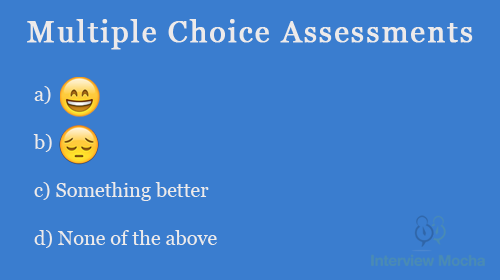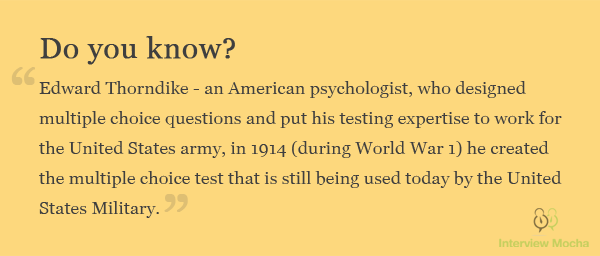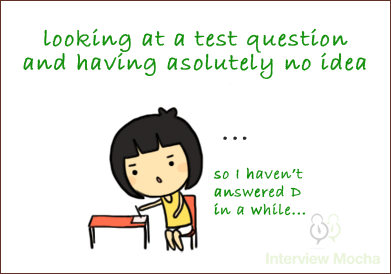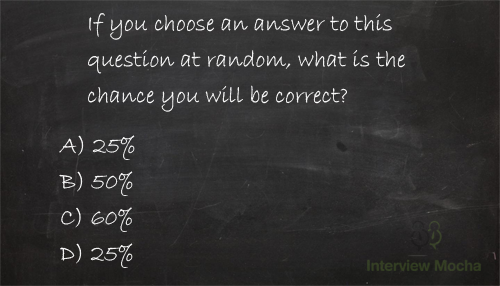
While surfing the internet I found a lot of material on how to make great multiple choice question, tips for writing valid and reliable multiple-choice questions and much more.
Even I found articles on how to cheat on any Multiple Choice Question? The top ones were “when in doubt choose c” and “all of the above” is usually the correct answer. It must be true for theory based questions but not all the time.
When it comes to creating assessments the multiple choice question is the default question format we add. But where did it come from? Is there any proof that multiple choice questions are effective? Are there alternatives that we should be using to test the candidates? In this article, we'll dig a little deeper.

Why do we use MCQs?
1. Multiple choice questions provide a reliable way of delivering a knowledge check based on the information taught in the module.
2. It is extremely quick and easy to write a multiple choice question, the author can simply review critical information within the content and create questions.
3. Multiple-choice items are best used for checking whether students have learned facts and routine procedures that have one, clearly correct answer. However, an item may have two reasonable answer options. Therefore, test directions usually ask test takers to select the "best" possible answer.
4. When it comes to marking, whether automated or manual, multiple-choice questions are easy to analyze. One can quickly assess hundreds of multiple-choice questions to provide an accurate report on performance.
5. Carefully designed MCQs can even test somewhat higher-level learning, such as comparison, application, and possibly basic analysis, focusing on particular concepts.
Is multiple choice testing a true and fair test of the knowledge?
There are too many criticisms of multiple choice questions. Critics say that Multiple Choice Questions (MCQs) assess only the lowest levels of student learning and offer candidates greater opportunities to guess at answers. Multiple choice questions are only at the recall level of knowledge.
Does it surprise you that candidates select the choices C and D because it is the most common place for the correct answer when it comes to factual or theory based questions? This is what the candidates are straight up to when they don’t have a clue.

This is the actual scenario how the candidate selects the answer and sometimes the best way of guessing multiple choice questions for candidates is “In pin safety pin ...in ...pin out!!” Lol :)
But, MCQs as assessment items can be defended on several points.
1. MCQs are particularly valuable when they require students to apply theories, general principles, or models to identify or interpret a situation, draw conclusions, or forecast.
2. Carefully written multiple-choice questions also can measure somewhat more complex mathematical knowledge such as integrating information or deciding which mathematical procedures to use to solve problems.
3. The thing about multiple-choice questions is that the answer is right there on the screen. So the challenge as question-writers is to construct the question and its answer choices in such a way that the learner really has to master the objective in order to select the correct choice.
Are you totally relying on multiple choice tests?

Relying on multiple-choice tests as a primary method of assessment can be dangerous for some reasons.
Students may recognize or know facts or procedures well enough to score high on the test, but not be able to think about the subject or apply knowledge, even though being able to think and apply is essential to "knowing" any subject. Therefore, the conclusion or inference that a student is good at a particular skill because he got a high score on a multiple-choice test may be false.
Facts and procedures are necessary for thinking, but assessments should not be driven by multiple-choice testing into minimizing or eliminating thinking and problem-solving. Therefore, assessments and standardized tests should not rely more than a small amount on multiple-choice or short-answer items.
MCQs together with other question types or activities can be used that enable students to demonstrate what and how they have learned, in a different way.
Future of Assessments - Getting Smart
I hope this is not the scenario :)

“As time goes on, advances in science and technology will allow talent assessments to become increasingly more effective, and the more effective talent assessments become, the less anyone will notice them.”- ERE MEDIA (This is not a Test – It’s the Future, by Dr. Charles Handler)
The future of assessments is the big question and issue that will shape how assessment evolves over the next decade and beyond. No doubt, multiple choice questions still remains one of the most commonly used assessment formats and are here to stay.
Knowing that multiple choice is the most common type of question used in skills assessments - but what other options do we have? The assessment market is ripe for disruption, and as 2016 unfolds, it is expected to see more direct signs of a changing of the guard. The pressure to provide value to both business leaders and job seekers will force assessment providers to adapt or die.
Being an assessment provider, imocha is trying to build skills assessment software that will provide more insights to the hiring managers on skills and competencies of the candidates and making it better for candidates to prove themselves beyond their resume with a standard test, helping them figure out where their “perfect job” may be. In my next articles, I will be discussing on imocha’s tangible shift on how pre-employment testing software can be better with multiple choice questions along with other types of question formats.
At present this area is still wide open but success will require the ability to buy into the measurement process driving results and reports. This creates a significant opportunity for to fill this need.
What type of questions do you prefer to use in your pre-hire assessments? Do share in the comments below.

